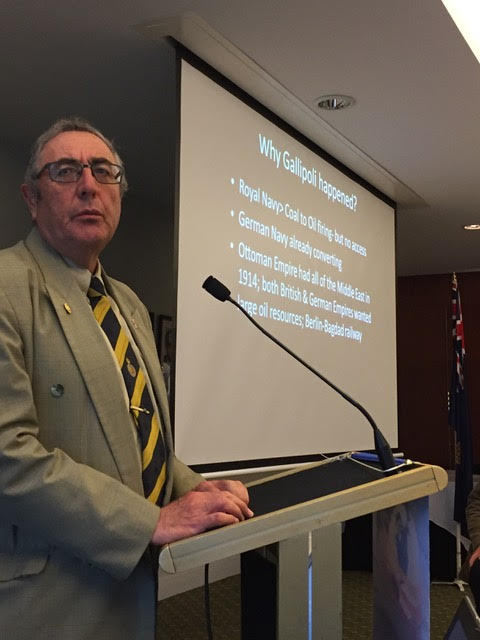A Different Perspective on Gallipoli....
Posted on Apr 18, 2017

With no meeting on ANZAC day this year the club was fortunate to have an address from Dr John Basarin on Gallipoli and the peace initiatives (Rotary’s part too) that have evolved in the 100 years since.
John is certainly suited to the task, moreover history gives him a “foot in both camps”. Born in Istanbul, Turkey, but based in Australia since 1973 he trained as a chemical engineer. Working in the offshore oil industry he has lived and worked in Norway, USA, Brazil, Germany and the UK. Personally aware of the value of international travel and friendships he persistently encourages young people to embrace through the Rotary Youth Foundation and Friends of Gallipoli. He is a long term Rotarian, and recipient of various peace awards. .jpg)
.jpg)
Further his research of the first ANZAC campaign has been prolific and learned. He has been awarded a PhD by Deakin University. His thesis, entitled Battlefield Tourism: Anzac Day Commemorations at Gallipoli is the culmination of a life-long interest in Gallipoli. He co-authored 6 books on the topic in Turkish and English.
John’s address had two thrusts, the history of Gallipoli and the present day organization Friends of Gallopoli.
The latter provides opportunities for young students to go to Gallipoli and attend the ANZAC Day Dawn and Lone Pine Ceremonies. It initiates learning programs and Youth Tours that give young people the chance to explore their mutual ties to Gallipoli. Australian and Turkish youths explore a shared history and the rich and rewarding bounty of international friendship. The relationship today is quite contrary to the battlefield 100 years ago.
The audience’s interest was high. Many wondered how a unique a strong relationship could develop between Australia and Turkey---there is no parallel in the world for one country to positively host a celebration by a foreigners commemorating a previous invasion attempt.
Re the history of Gallipoli John’s thesis as per his latest book was that the allied invasion attempt had a myriad of strategic factors behind it, not the least of which was the British Empires concern about future oil needs. .jpg)
.jpg)
This stimulated discussion. In a fascinating presentation we were reminded of “the need for a second front”, “access to the Black Sea to preserve wheat sources”, and even the naive thoughts of senior Allied leaders conducting 20th century wars with 19th century tactics!. We were reminded of a bit of history about the Sykes-Picot line which was drawn up (literally a simple line on a map) post WW1 to split up the residue of the Ottoman Empire to the control of three European countries.
Thanks John it was an appropriate ANZAC prelude combining aspects of history with positive reinforcement for the peace process in which Rotary is heavily involved with its current 1000+ peace scholars.